Venezuela State-Licensed Crypto Mining Requirements: What You Must Know in 2025
Venezuela Crypto Mining Tax Calculator
Mining Input
Compliance Checklist
Tax Breakdown
High Risk: 87% Compliance RiskNet Earnings After Tax
Compliance Requirements
What You Need to Know About Legal Crypto Mining in Venezuela Right Now
If you're thinking about mining cryptocurrency in Venezuela, you're not just setting up hardware-you're stepping into one of the most tightly controlled crypto systems on Earth. Unlike other countries where mining is open or lightly regulated, Venezuela forces every miner to work under the government’s thumb. The state doesn’t just collect taxes-it owns the output. And if you try to mine outside their system? Your equipment gets seized. Your bank account could be frozen. You could face legal trouble.
This isn’t theoretical. Since 2020, Venezuela has required all miners to join the National Digital Mining Pool, a government-run system that takes direct control of mining rewards. There’s no option to opt out. No anonymity. No decentralization. Just compliance-or consequences.
The Only Legal Path: SUNACRIP Licensing
To mine legally in Venezuela, you must get a license from SUNACRIP-the National Superintendency of Crypto Assets and Related Activities. This agency, created in 2018 and reorganized in March 2024 after a major corruption scandal, is the only body that can issue mining permits. You can’t just plug in your rigs and start hashing. You need paperwork.
The application process isn’t quick. It takes between three and six months. You’ll need:
- A registered business entity in Venezuela
- Detailed technical specs of your mining equipment
- Proof of electricity access and power capacity
- Financial projections showing how you’ll cover costs
- Proof of compliance with AML/KYC rules
Even if you’re a solo miner, you must register as a legal business. There’s no personal mining license. If you’re importing mining hardware, you need a separate import permit-vetted and approved by Venezuelan customs. Many report delays of months, sudden fee hikes, and arbitrary requests for additional documents.
The National Digital Mining Pool: No Choice, No Control
Here’s the catch: Even after you get your license, you don’t get to keep control of your rewards. Every legal miner in Venezuela must connect to the National Digital Mining Pool. This isn’t just a recommendation. It’s the law.
The pool aggregates all mining output from every licensed miner in the country. The government then distributes payouts based on your contribution-but they decide when, how much, and if you get paid at all. There are no public algorithms. No transparency. Miners on Venezuelan forums report payment delays of three to eight months, with no explanation. Some say their payouts were frozen without warning, then restored weeks later.
Why does the government do this? Because they want to tax every bitcoin, every ether, every altcoin you mine. By controlling the pool, they can track every hash, every reward, every transaction. They don’t need to audit you-they already see your earnings in real time.
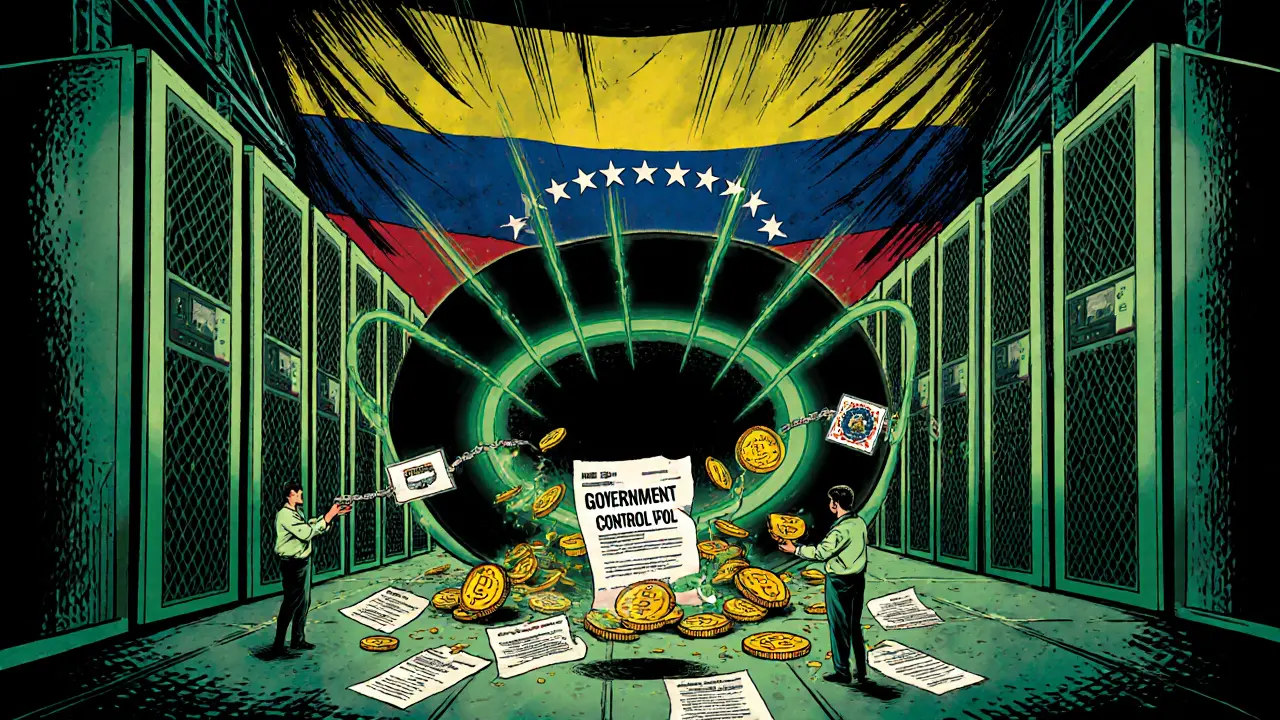
Taxes: You’re Paying Up-No Matter What
Once you’re in the system, the tax bills start rolling in. Venezuela doesn’t have a dedicated crypto tax law. Instead, they use existing laws and stretch them to fit.
- IGTF (Large Financial Transactions Tax): Up to 20% on any crypto transaction not done in bolívares or the Petro. This hits when you sell, trade, or convert your mined coins.
- ISLR (Income Tax): Applied to profits from mining. If you sell your Bitcoin for cash or goods, that profit is taxable income.
- VAT (Value-Added Tax): 16% on exchange fees or services related to crypto, even if the trade itself isn’t taxed.
The tax authority, SENIAT, is ramping up enforcement in 2025. They’re using KYC data from exchanges and blockchain analysis tools to track unreported mining income. If you’re mining legally, you’re on their radar. If you’re mining illegally? They’re coming for your hardware.
Record Keeping: 10 Years of Paperwork
Most countries ask for a few years of records. Venezuela wants ten.
Every miner must maintain detailed logs of:
- Equipment used (model, serial number, power draw)
- Hours of operation
- Energy consumption (in kWh)
- Every reward received (date, amount, coin type)
- Every payout from the National Pool
- Every tax payment made
These records must be stored digitally and physically. Failure to produce them during an audit can lead to license revocation, fines, or even criminal charges. For small miners with just a few rigs, this is a nightmare. It’s not just time-it’s cost. You need accounting software, backup systems, and possibly a local bookkeeper who understands crypto.
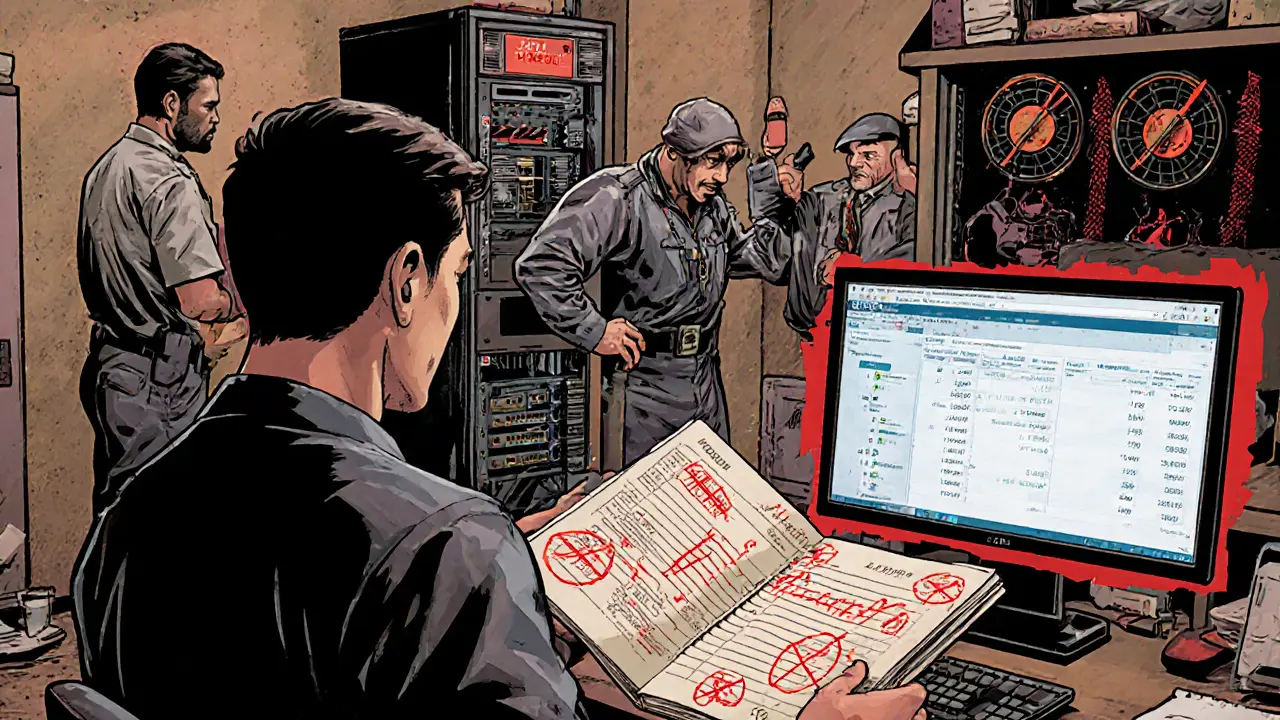
Why This System Is Broken
Let’s be clear: Venezuela’s crypto mining model contradicts everything Bitcoin was built for. Decentralization? Gone. Financial sovereignty? Erased. Trustless systems? Replaced with a state-run ledger.
The 2023 corruption scandal that shut down SUNACRIP exposed deeper problems. Over $3 million in crypto assets were allegedly stolen by officials. The agency was suspended for over a year. When it came back in 2024, it was restructured-but no one knows if it’s truly clean.
International observers call it a mining tax farm. The government doesn’t care if you make money. They care that you pay them. And they’ve built a system where they can pause your income at any moment, without warning, without appeal.
Miners who tried to operate outside the system have had their equipment confiscated. Some have been fined thousands of dollars. Others disappeared from online forums after sudden raids.
Is It Worth It?
Electricity in Venezuela is cheap-sometimes free for state-approved operations. That’s the only real advantage.
But here’s what you lose:
- Control over your earnings
- Privacy
- Speed of payout
- Legal certainty
- Trust in the system
Most miners who stay in the system do so because they have no other choice. The bolívar is still collapsing. Inflation hit 1,000,000% in 2019. Crypto is the only way many survive. But survival doesn’t mean security.
If you’re a foreign company considering mining in Venezuela, walk away. The risks outweigh the rewards. The regulatory environment is unstable. The legal framework is arbitrary. The political situation is volatile. And the government has shown it will change the rules overnight.
If you’re a local miner? You’re not just mining crypto. You’re navigating a minefield.
What’s Next in 2025?
Expect tighter enforcement. SENIAT and SUNACRIP are rolling out new blockchain tracking tools. They’re linking exchange accounts to mining IDs. They’re cross-referencing bank transactions with mining payouts.
Private sector input is now allowed through CAVEMCRIP, a new industry group. But it’s unclear how much influence they really have. The government still holds all the power.
There’s no sign of deregulation. No movement toward decentralization. The state isn’t trying to attract innovation-it’s trying to extract value.
By the end of 2025, the only legal miners in Venezuela will be those who accept total state control. Everyone else will be operating illegally-and risking everything.
Can I mine crypto in Venezuela without a license?
No. Mining without a SUNACRIP license is illegal. The government actively monitors for unlicensed operations. If caught, your mining equipment will be confiscated, your bank accounts may be frozen, and you could face fines or criminal charges. There is no gray area.
How long does it take to get a mining license in Venezuela?
The licensing process typically takes 3 to 6 months. You must first register a business, then submit detailed technical and financial documents to SUNACRIP. Delays are common due to bureaucracy, staffing shortages, and changing requirements. Many applicants report being asked for additional paperwork multiple times.
Do I have to use the National Digital Mining Pool?
Yes. All licensed miners are legally required to connect to the National Digital Mining Pool. This is non-negotiable. The pool controls all mining rewards, determines payouts, and reports earnings directly to tax authorities. You cannot mine independently and remain legal.
What taxes do I pay on crypto mining in Venezuela?
You pay three main taxes: (1) IGTF-up to 20% on crypto transactions not in bolívares or Petro; (2) ISLR-income tax on mining profits; and (3) VAT-16% on exchange or service fees. There’s no separate crypto tax law, so SENIAT applies existing income and transaction tax rules. Record-keeping is critical to prove your costs and reduce taxable income.
Is Venezuela’s crypto mining system stable?
No. SUNACRIP was suspended in March 2023 due to corruption scandals and only resumed operations after reorganization in March 2024. Enforcement is inconsistent. Rules change without notice. Payment delays are common. The system is politically driven, not economically rational. It’s high-risk and unpredictable.
Can foreign companies legally mine crypto in Venezuela?
Technically, yes-if they register a local business and comply fully. But practically, no. The political climate, risk of asset seizure, lack of legal protections, and unstable infrastructure make it extremely risky. Most international firms avoid Venezuela entirely. The potential rewards don’t justify the exposure.
What happens if I don’t keep 10 years of mining records?
Failure to maintain the required 10-year records can lead to license suspension or revocation. You may be fined, audited, or charged with tax evasion. SUNACRIP and SENIAT conduct random audits, and incomplete records are treated as evidence of non-compliance. Digital backups alone are not enough-you must also have physical copies available upon request.
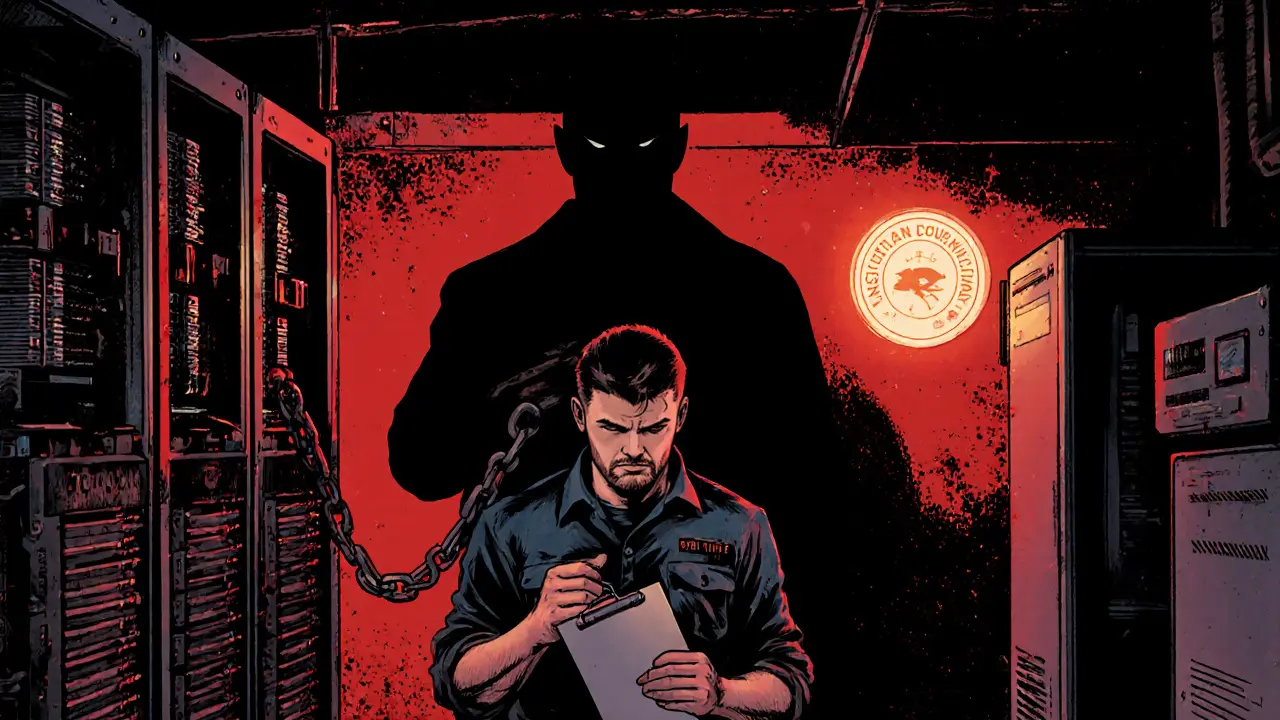

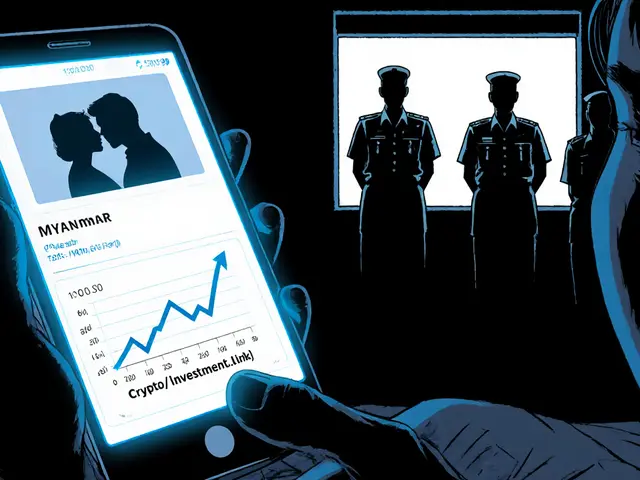


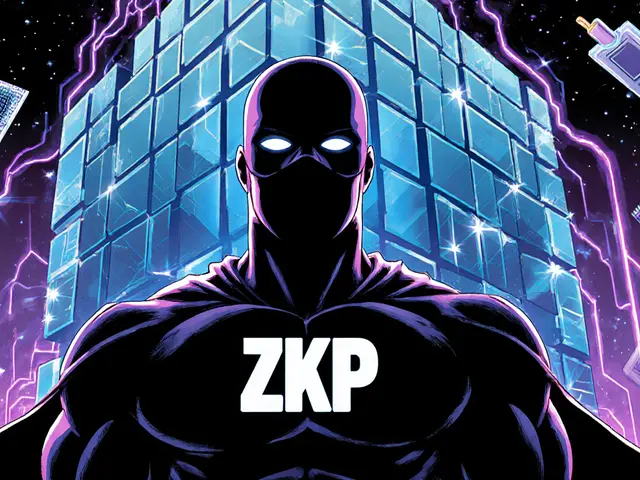
20 Comments
Nidhi Gaur
November 16 2025I mean honestly if you're mining in Venezuela you're already playing Russian roulette with your hardware and your sanity. The government doesn't want you to succeed they just want your hash rate and your cash.
Good luck keeping your rigs running past next month.
Gaurang Kulkarni
November 17 2025This whole system is a tax farm disguised as innovation and if you think the 10 year record keeping is bad wait till they start requiring notarized screenshots of your ASICs running with GPS timestamps and a live feed to SUNACRIP
Theyre not regulating crypto theyre building a digital police state and the miners are just the data cows
garrett goggin
November 17 2025Of course theyre monitoring everything because the same people who stole 3 million in crypto are now the ones running the audit team
Its not a mining pool its a honeypot and if you think the government cares about your profits youve never seen a Venezuelan bureaucrat smile at a bank statement
satish gedam
November 18 2025To anyone thinking of trying this: I get the appeal of cheap power but the tradeoff is total loss of control
Imagine waking up one day and your Bitcoin is gone not because the market crashed but because some clerk in Caracas decided your payout was 'suspicious'
It's not mining its hostage negotiation with a state that has zero accountability
But hey at least your electricity bill is free right?
jesani amit
November 18 2025Ive been following this since 2021 and the only people still mining are either desperate locals who have no other way to feed their families or dumb foreigners who think they can outsmart a regime that has been stealing from its own people for decades
Its not a business model its a survival tactic wrapped in blockchain jargon
And dont even get me started on the 10 year records
Most of these guys are using laptops in their kitchens with no backup systems
Theyre not going to survive an audit theyre just going to disappear
Jerrad Kyle
November 19 2025Venezuela turned crypto mining into a state-run extractive industry and somehow made it weirder than the Petro
Its like if Satoshi had a baby with a Soviet commissar and the baby grew up to run a DMV with a blockchain terminal
Theyre not building a financial revolution theyre building a surveillance pyramid scheme where the only currency is compliance
Jess Zafarris
November 20 2025Funny how the same people who scream about decentralization are now begging for government licenses to mine
Its like joining the mafia and then filing a complaint when they take your cut
The only thing more ironic than this system is the fact that people still call it crypto
Usama Ahmad
November 21 2025I know a guy who tried to mine in Maracaibo last year
Got his license after 5 months then got his first payout after 9 months
Half of it was in Petro
He tried to cash out and his bank froze his account
Now he sells coffee and charges in USD
Still mining but only for the memes
Ella Davies
November 21 2025The real tragedy here isnt the bureaucracy its that the miners who need this the most are the ones least equipped to handle it
Single moms with two rigs in their living room trying to file AML paperwork in Spanish while their kids do homework on a tablet powered by the same electricity theyre mining with
This isnt policy its a cruel joke
Marcia Birgen
November 21 2025Ive seen this pattern before in countries where the state replaces trust with control
They dont want you to be rich they just want you to be visible
And once you're visible you become a tax source not a participant
Its not crypto its compliance theater with a GPU
Peter Rossiter
November 23 2025The fact that theyre using blockchain to track miners while their own system is corrupt is the most Venezuelan thing Ive ever seen
Like using a Tesla to deliver a letter in a country with no roads
rahul saha
November 24 2025The National Digital Mining Pool is the ultimate irony of the crypto age
Decentralization was supposed to liberate us from centralized power
But here we are mining for a state that owns the ledger the rewards and your future
Its not capitalism its crypto-feudalism and you're the serf with a rig
Henry Lu
November 26 2025If you think this is bad wait till they start requiring your mining rig serial numbers to be tattooed on your forearm
At least then youll know who to blame when your hardware gets confiscated
Also the Petro is still garbage dont even try it
nikhil .m445
November 27 2025This is why crypto will never be mainstream
Even in the most broken economies people still want control
And Venezuela proves that if you give the state a blockchain they will use it to control you better than any fiat ever could
They are not innovating they are institutionalizing oppression
Lori Holton
November 29 2025Let me guess the next step is mandatory biometric verification at mining hubs and a national crypto ID card linked to your social security number
And then theyll start charging you for the privilege of being monitored
This is how dystopias begin not with a bang but with a form you have to fill out in triplicate
Nathan Ross
November 29 2025The only thing more absurd than this system is the fact that anyone still believes in the narrative that crypto is about freedom
When the state controls your hash rate your rewards and your records you are not decentralized you are digitized serfdom
Rick Mendoza
November 30 2025Ive seen more transparency in a North Korean state report than I have in the National Digital Mining Pool payout logs
And they still manage to make it sound like its a good deal
Just give them your rigs your data and your dignity and theyll maybe send you some Bitcoin in 2027
Mike Gransky
December 1 2025If you're thinking of mining in Venezuela ask yourself this: Would you trust a government that stole 3 million in crypto to manage your financial future?
Because thats the deal
No one is asking you to be a hero
Just don't be the sucker who thought this was a business opportunity
Bill Henry
December 3 2025I used to think crypto was the escape hatch from broken systems
Now I see it as just another way the powerful find new ways to extract value from the desperate
And Venezuela? They turned it into a full-blown extraction factory with electricity as the bait
jesani amit
December 4 2025I just want to say to the locals reading this: you're not alone
Im not from Venezuela but I know what it means to try to build something real in a system designed to crush you
Keep your records
Keep your head down
And if you can find a way to send your Bitcoin out of the country do it quietly
Theyre watching
But you're still here
And that counts for something